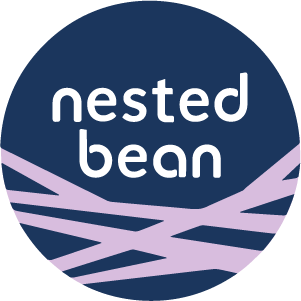Shopping Cart

If you’re having trouble remembering the words to your favorite childhood nursery rhyme, don’t worry — it happens to the best of us.
To help you out, we’ve put together a cheat sheet.
Here are thirteen of the most popular childhood nursery rhymes, along with simple hand movements, to enjoy with your baby:
- Itsy bitsy spider
- Head, shoulders, knees, and toes
- Little piggy went to market
- Humpty dumpty
- Open shut them
- Pat-a-cake
- Row row row your boat
- Jack in the box
- Jack and Jill
- Zoom, zoom, zoom
- If you’re happy
- Baa Baa Black Sheep
- I’m a Little Teapot
1. The Itsy Bitsy Spider
Itsy bitsy spider climbed up the water spout (alternate forefinger and thumb moving upward)
Down came the rain (wiggle fingers from high to low)
and washed the spider out (move hands to the sides and make a whoosh sound)
Out came the sunshine and dried up all the rain (hands come above head to make a circle)
And the itsy bitsy spider climbed up the spout again (alternate forefinger and thumb)
Song origin: The origin of the itsy bitsy spider is unknown however the first known children’s publication is in Mike and Peggy Seeger’s American Folk Songs for Children in 1948.
2. Head, Shoulders, Knees, and Toes
Head, shoulders, knees and toes,
Knees and toes.
Head, shoulders, knees and toes,
Knees and toes.
And eyes and, ears and, mouth and nose.
Head, shoulders, knees and toes,
Knees and toes.
Repeat.
The hand motions to Head, Shoulders, Knees and Toes are really easy. You simply touch the body part you’re singing.
As the song is repeated, one word is omitted each time.
For example, Verse 2
—- (touch head), shoulders, knees and toes
This pattern continues until all the words are omitted. The last verse consists of no singing at all where you’re touching each body part silently to the rhythm of the rhyme.
Song origin: Head, shoulders, knees and toes was documented as early as 1961 in the Milwaukee Journal article, Troubadour Pleases Playground Audience.
3. This Little Piggy Went to Market
This little piggy went to market. (touch big toe)
This little piggy stayed home. (touch pointer toe)
This little piggy had roast beef. (touch middle toe)
This little piggy had none. (touch ring toe)
And this little piggy cried, "Wee, wee, wee!" (touch pinky toe)
All the way home. (tickle up to their chest)
Song origin: There have been many versions over time but the first children’s publication on record is The Famous Tommy Thumb's Little Story-Book, published in London about 1760.
4. Humpty Dumpty
Humpty Dumpty sat on a wall. (sit or hold baby in your lap facing you)
Humpty Dumpty had a great fall. (tip baby back slightly)
All the king’s horses and all the king’s men (bring baby back up to sitting position)
couldn’t put Humpty together again. (x3)
Song origin: Humpty Dumpty spans back as early as 1797. However the modern version we are familiar with today was added as a manuscript to Mother Goose's Melody published in 1803.
5. Open Shut Them
Open, shut them, (open and close both hands in front of baby)
Open, shut them, (open and close both hands in front of baby)
Give a little clap. (clap hands)
Open, shut them, (open and close both hands in front of baby)
open, shut them, (open and close both hands in front of baby)
Lay them in your lap. (place hands neatly/silently in your lap)
Song origin: origins of the Open Shut Them song is unknown however it has played on popular children’s television shows like the Wiggles in 2014.
6. Pat-a-Cake
Pat-a-cake pat-a-cake baker's man, (clapping on both lap and hands with words)
Bake me a cake as fast as you can. (clapping on both lap and hands with words)
Roll it. (rolling hands)
And pat it. (pat hands, turning one of top of the other)
and mark it with a B. (draw a B with your finger on babies hand)Put it in the oven for baby and me! (moving hands forward like placing in an oven)
Song origin: The pat-a-cake nursery rhyme we are most familiar with comes from the 1765 Mother Goose’s Melody.
7. Row, Row, Row Your Boat
Row, row, row the boat
Gently down the stream
Merrily merrily merrily merrily
Life is but a dream
You may have noticed, we did not include hand movements with this nursery rhyme. That is because there are a few variations depending on the age of your child.
For babies, hold them facing you (supporting the head and neck) and gently rock back and forth.
For babies sitting independently, sit facing each other and roll a ball back and forth to the rhythm of the rhyme.
Song origin: The earliest printing of the lyrics for Row, Row, Row Your Boat is from 1852, however the modern tune we sing today was recorded in 1881 in The Franklin Square Song Collection by Eliphalet Oram Lyte.
8. Jack in the Box
Jack in the box (cover your finger)
Still as a mouse. (sway hands back and forth)
Deep down inside his little dark house. (sway hands back and forth)
Jack in the box. (sway hands back and forth)
Resting so still. (hold hands still)
Will you come out? (speak to your hands)
Yes, I will! (bring our finger and tickle baby)
Song origin: The origin for the nursery rhyme Jack in the Box is unknown however the phrase, “Jack in the Box” was first seen in 1563.
9. Jack and Jill
Jack and Jill went up the hill (Hold up one thumb for Jack and one for Jill.)
To fetch a pail of water. (Move hands upwards alternating thumbs.)
Jack fell down and broke his crown, (Tip the Jack thumb to the side and rotate down.)
And Jill came tumbling after. (Tip the Jill thumb to the side and rotate down.)
Song origin: Jack and Jill dates back to the 18th century. The melody we sing with the rhyme today was first recorded in 1870.
10. Zoom, Zoom, Zoom
(place hands together over your head pretending to be a rocket ship, leaning side to side)
Zoom, Zoom, Zoom
We’re going to the moon.
Zoom, Zoom, Zoom.
I hope we get there soon.
5, 4, 3, 2, 1, (count down with fingers)
Blast off! (gently lift baby into the air supporting their head and neck; older kids can jump)
Song origin: origin of this nursery rhyme is unknown.
11. If You’re Happy
If you’re happy and you know it, clap your hands. (clap hands x2)
If you’re happy and you know it, clap your hands. (clap hands x2)
If you’re happy and you know it then your face will surely show it. (exaggerated smile)
If you’re happy and you know it, clap your hands. (clap hands x2)
Repeat with stomp your feet, tap your head, rub your belly, jump up and down.
Song origin: The origin of the melody is unknown but some sources trace it back to Latvia. In 1971, Jonico Music filed for copyright on the song, crediting it to Joe Raposo an American composer and songwriter best known for his work on Sesame Street.
12. Baa Baa Black Sheep
Baa, baa, black sheep, (put hands up like ram horns)
Have you any wool? (motion hands in front of chest like clothing)
Yes sir, yes sir, (nod for yes)
Three bags full. (hold up three fingers)
One for the master, (hold up one finger)
One for the dame, (hold up two fingers)
And one for the little boy (hold up three fingers)
Who lives down the lane (make a forward motion)
Song origin: "Baa, Baa, Black Sheep" is an English nursery rhyme, the earliest printed version of which dates from around 1744.
13. I’m a Little Teapot
I’m a little teapot, (Point thumbs to self)
Short and stout, (Round arms and touch fingertips together in front of body)
Here is my handle, (Place L fist on hip)
Here is my spout. (Bend R elbow, raise forearm, and lower wrist)
When I get all steamed up,
Hear me shout, (Remain in same position and nod head)
Tip me over (Tip sideways to the right)
And pour me out!
Song origin: "I'm a Little Teapot" was originally written for the younger students at George Harold Sanders and Clarence Z. Kelley dance school in the late 1930’s.
Final Thoughts
Babies love music and love repetition. Most importantly, though?
Babies love to share in your fun. They like to participate in what’s going on around them.
Experiencing and doing all the things you do is part of how they build their understanding of the world.
Music can promote healthy cognitive development for infants and toddlers in many ways; it promotes physical activity, memory, language skills and even math skills!
Now, next time you need to put on a show for your little one before bedtime, you won’t have to stress about whether or not you remember all the lyrics.

